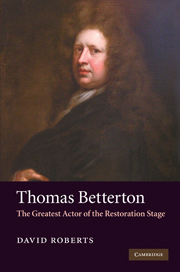Book contents
- Frontmatter
- Dedication
- Contents
- List of illustrations
- Acknowledgements
- Note on dates and texts
- Chapter 1 Introduction
- Chapter 2 Look, my lord, it comes
- Chapter 3 An obstinately shadowy Titan
- Chapter 4 An actor of London: early years, 1635–1659
- Chapter 5 A walk in the park
- Chapter 6 In the Duke’s Company, 1660–1663
- Chapter 7 Equal with the highest
- Chapter 8 Actor management
- Chapter 9 In the Company of the Duke
- Chapter 10 Union
- Chapter 11 Back to the future
- Chapter 12 Books and pictures
- Notes
- Bibliography
- Index
Chapter 6 - In the Duke’s Company, 1660–1663
Published online by Cambridge University Press: 05 July 2014
- Frontmatter
- Dedication
- Contents
- List of illustrations
- Acknowledgements
- Note on dates and texts
- Chapter 1 Introduction
- Chapter 2 Look, my lord, it comes
- Chapter 3 An obstinately shadowy Titan
- Chapter 4 An actor of London: early years, 1635–1659
- Chapter 5 A walk in the park
- Chapter 6 In the Duke’s Company, 1660–1663
- Chapter 7 Equal with the highest
- Chapter 8 Actor management
- Chapter 9 In the Company of the Duke
- Chapter 10 Union
- Chapter 11 Back to the future
- Chapter 12 Books and pictures
- Notes
- Bibliography
- Index
Summary
As an actor Betterton walked in company in two senses: with people of varying temperaments and abilities, and in an organisation with a hierarchy and procedures. John Rhodes’s company had a flat structure; pushing for legitimacy while avoiding the law, it might be forced at any moment to pack up and fade into the provinces. When he moved to Sir William Davenant’s Duke’s Company in autumn 1660, Betterton entered a different world – a stratified, stable operation enjoying the protection of a licence, published terms and conditions and relatively transparent finances. Here, ‘lines’ of performance – the types of parts for which actors became known – and lines of responsibility could readily be communicated and maintained, and the result was a harmonious working environment well suited to theatrical innovation. Betterton was its product and best advocate, and in deciding to join he had his eyes wide open.
The story of how the Restoration companies formed is too familiar to need repetition here, so this chapter reorients the narrative towards Betterton and explains the choices he faced at the start of his career. While Rhodes was getting into trouble for acting without official approval, Davenant had divined in March 1660 how restored royal policy would move and secured a lease on the old tennis court in Lincoln’s Inn Fields. Others, including Thomas Killigrew, William Beeston and George Jolly, had their own plans, and their manoeuvrings meant that Charles returned to London to a reception of adoring crowds and, among legion petitioners, importunate old stagers. If Betterton was there on the streets with John Evelyn and the ‘triumph above 20,000 horse and foot, brandishing their swords and shouting with inexpressible joy’, his feelings were probably reflected in the poem he is thought to have published for John Crouch in 1660. Its baroque mingling of the spiritual and the erotic foreshadows territory his acting would chart in the 1670s and 1680s, while in coronation entertainments such as John Ogilby’s were premonitions of Betterton’s later experiments with lavish multi-media productions: ‘Great Charles’, wrote Crouch,
brought upon Angel’s wings, appears,
The long despair of prayers, of sighs of tears,
Welcome three kingdoms’ love, methinks all three
Now in my heart’s triangle panting be.
- Type
- Chapter
- Information
- Thomas BettertonThe Greatest Actor of the Restoration Stage, pp. 69 - 82Publisher: Cambridge University PressPrint publication year: 2010



